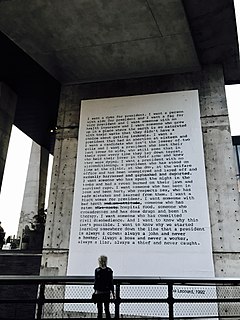A Quote by Antonio Tabucchi
Fifty years after half a million gypsies were exterminated in the Second World War - thousands of them in Auschwitz - we're again preparing the mass killing of this minority.
Related Quotes
What would be the difference if we retreated and let the French and Germans make decisions for the world? We tried that twice in the last century. Isolationsim, refusing to accept our role in the world, and delaying our response to evildoers ultimately cost fifty-three million lives in World War 2 alone. The preemption policy of the Bush administration, taking the war to the enemy and exporting democracy and freedom, has liberated fifty million.
In 1970, there were approximately 330,000 prisoners in the US. Today there are 2.3 million behind bars - more than any country in the history of the world. In 2009 alone there were 1.6 million drug-related arrests in the U.S. 1.3 million of these were for possession of drugs alone. Over half were related to marijuana. The forty-year war on drugs has cost $2.5 trillion.
... there was the first Balkan war and the second Balkan war and then there was the first world war. It is extraordinary how having done a thing once you have to do it again, there is the pleasure of coincidence and there is the pleasure of repetition, and so there is the second world war, and in between there was the Abyssinian war and the Spanish civil war.
Between the postwar fifties - domesticity, people happy to be alive after the Second World War, wanting to build a home, make a family, make a nest. Women were pushed back into the home after having been active in the Second World War. It was a big Doris Day moment for women, which didn't suit all women.
The same costume will be Indecent ten years before its time, Shameless five years before its time, Outre (daring) one year before its time, Smart (in its own time), Dowdy one year after its time, Ridiculous twenty years after its time, Amusing thirty years after its time, Quaint fifty years after its time, Charming seventy years after its time, Romantic one-hundred years after its time, Beautiful one-hundred-and-fifty years after its time.
With the persistence of tensions and conflicts in various parts of the world, the international community must never forget what happened at Hiroshima and Nagasaki, as a warning and in incentive to develop truly effective and peaceful means of settling tensions and disputes. Fifty years after the Second World War, the leaders of nations cannot become complacent but rather should renew their commitment to disarmament and to the banishment of all nuclear weapons.
The threat of Saddam Hussein with weapons of mass destruction is real, but as I said, it is not new. It has been with us since the end of that war, and particularly in the last 4 years we know after Operation Desert Fox failed to force him to reaccept them, that he has continued to build those weapons. He has had a free hand for 4 years to reconstitute these weapons, allowing the world, during the interval, to lose the focus we had on weapons of mass destruction and the issue of proliferation.






































